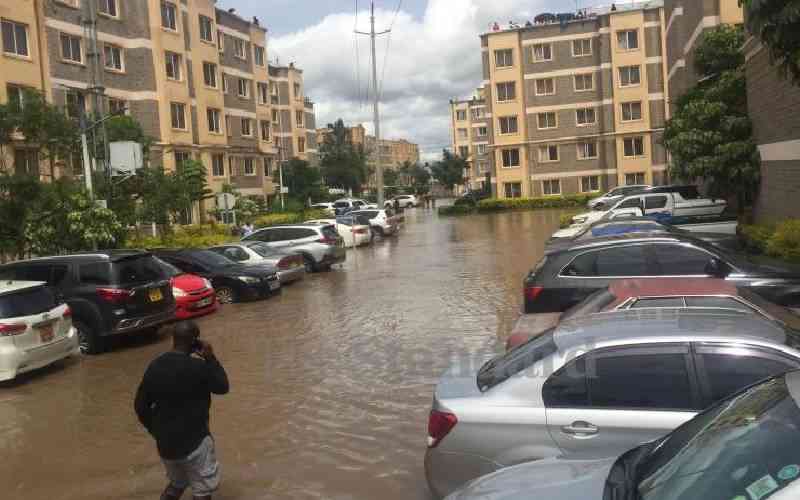Farmers from the maize producing belt of the North Rift are in a rush to harvest their crop amid anxiety that the El Niño rains are set to pound the country any time.
Last week, a heavy downpour slowed maize harvesting in Trans Nzoia County, sparking fear of possible loss and wastage. For three consecutive days, the rains pounded the area and disengaged farmers from the harvesting exercise.
Middlemen were also affected by the rains as they were unable to dry huge consignments of maize they had imported from Uganda.
“The rains are frustrating us. It has slowed the harvest and we have to be up before 6 am to attend to our farms before the rain pounds,” lamented Tom Nyagechaga, a farmers’ representative.
The rains ceased earlier this week, bringing relief to the farmers who have embarked on a marathon harvest before the much-awaited El Niño rains. To hasten the exercise, the farmers have hired more people, including school- going children, to cut and stake the maize for easy harvesting.
“We are aware that the El Niño rains will cause massive losses. We are doing everything possible, including hiring pupils, to harvest the crop before the rains drop,” a farmer who declined to be named told The Standard on Saturday in Saboti.
Most farmers said they were hoping the rains don’t interfere with the harvest. “I am happy God has heard our prayers to delay the rains. I am done with 200 acres and 300 more are still to be harvested before the rains come,” said John Kiptum, a prominent farmer in Trans Nzoia.
In Kobos area, Job Tallam said the rains would leave a wave of destruction if they fall before farmers harvest their maize. “We are praying hard that the El Niño rains do not start soon,” said Tallam.
He said farmers fear that the anticipated rains would disrupt harvesting and render roads impassible, resulting in heavy losses for growers.
Local County Deputy Director of Agriculture Simon Mwombe said some maize crops were not ready for harvest. Mr Mwombe warned that maize would go to waste if the rains fall soon since most maize fields have not been harvested.
“Our farmers are yet to embark on serious harvesting activities because they have not cut and staked the crop,” he said.
Mwombe urged farmers to consider adopting community warehousing for their maize produce as a way of mitigating post-harvest losses.
Speaking recently at the Vi Agro-forestry in Kitale during a farmer’s open day, Mwombe advised farmers to invest in community stores. “Farmers face huge challenges such as theft, pests, and even aflatoxin infection when it comes to storage of maize at home.
We encourage you to embrace community stores in which you can keep your maize for long without incurring losses,” said Mwombe.
Community warehousing is a new concept driven by the county government to cushion farmers from losses incurred when they horde their produce as they wait for prices to rise.
Stay informed. Subscribe to our newsletter
Approximately 1.88 million bags of maize out of the five million harvested annually in Trans Nzoia are lost due to poor post-harvest practices, pests, theft and infection.
This year’s yield is estimated to be seven million bags owing to a huge uptake of the county-subsidised Mavuno fertiliser that cost the county Sh74.3 million.
The Trans Nzoia government has installed maize driers across the county to help farmers dry their crop and shield them from post-harvest losses.
Deputy Governor Stanley Tarus said the driers have been installed in Endebess, Cherangany and Kwanza.
“We have provided driers to help our farmers dry their maize before the El Niño rains start,” Tarus told farmers in Cherangany.
The deputy governor urged the national government to open up National Cereals and Produce Board (NCPB) depots on time.
 The Standard Group Plc is a
multi-media organization with investments in media platforms spanning newspaper
print operations, television, radio broadcasting, digital and online services. The
Standard Group is recognized as a leading multi-media house in Kenya with a key
influence in matters of national and international interest.
The Standard Group Plc is a
multi-media organization with investments in media platforms spanning newspaper
print operations, television, radio broadcasting, digital and online services. The
Standard Group is recognized as a leading multi-media house in Kenya with a key
influence in matters of national and international interest.
 The Standard Group Plc is a
multi-media organization with investments in media platforms spanning newspaper
print operations, television, radio broadcasting, digital and online services. The
Standard Group is recognized as a leading multi-media house in Kenya with a key
influence in matters of national and international interest.
The Standard Group Plc is a
multi-media organization with investments in media platforms spanning newspaper
print operations, television, radio broadcasting, digital and online services. The
Standard Group is recognized as a leading multi-media house in Kenya with a key
influence in matters of national and international interest.








